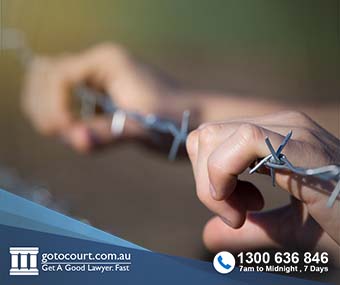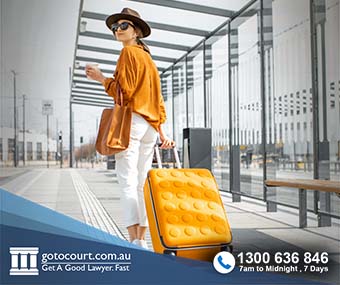Call our lawyers
now
or,
have our lawyers
call you
Australian Law and Pokémon Go
Australian Law and Pokémon Go
[vc_row][vc_column][vc_column_text]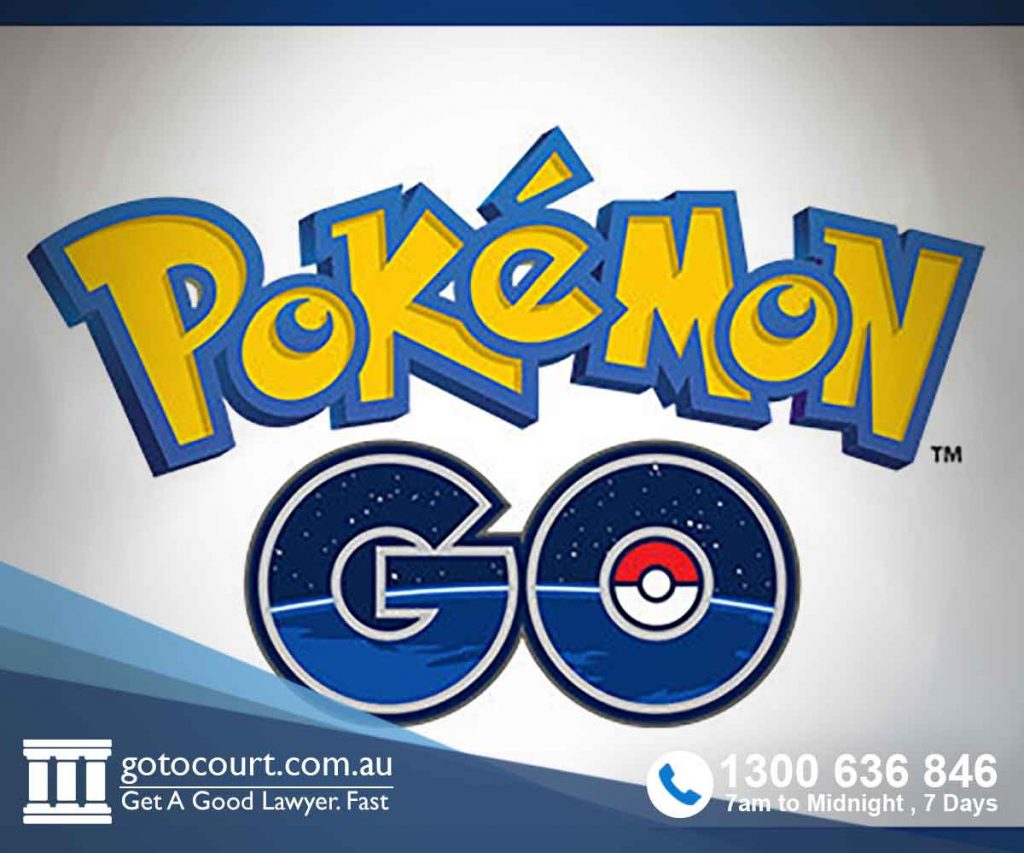 Something strange is happening all over Australia. Almost everywhere you look, there are groups of people – quite clearly unknown to each other – wandering around the country while glued, even more than usual, to the screen of their mobile device.
Something strange is happening all over Australia. Almost everywhere you look, there are groups of people – quite clearly unknown to each other – wandering around the country while glued, even more than usual, to the screen of their mobile device.
The cause of this phenomenon is the new game, Pokémon Go. For those few of you who are unfamiliar with it, Pokémon Go is an ‘augmented reality’ game that gets you up off the couch and out into your neighbourhood in search of Pokémon creatures. It uses the GPS and camera in your smartphone and overlays images of Pokémon characters into your surroundings. Depending on your location and the time of day, as you move, more and more characters appear. The goal is to collect all of the virtual characters. You do this by ‘throwing’ (or swiping the screen of your phone) a Poké Ball in their direction.
As the name clearly suggests, it is based on the original Nintendo Pokémon game – now 20 years old, although the Go version so far includes only the original 151 Pokémon characters while Pokémon itself currently has over 720.
The game seeks to get the players out and about as much as possible. It rewards movement – for example, you have to walk between 2 and 5 kilometres to be able to ‘incubate’ a creature you catch – and it can tell whether you are actually walking as opposed to driving. It essentially tries to replicate what the world around you would look like to you if the characters were actually alive in your area. It even generates characters to suit the area in which you are located, so if you are near a waterway, you will see more water creatures; if you are out after dark, you’ll see some of the fairies or ghosts.
In addition, it has identified places of note in the area and declares them to be ‘PokéStops’ and/or ‘gyms’. PokéStops are home to collectable items, such as Poké Balls and Pokémon eggs that will hatch into a creature. You can also drop a ‘lure module’ at a PokéStop and entice additional Pokémon to the area. The location then glows pink to alert other players to the increased likelihood of catching a character at the location. Of course, this generally requires you to purchase a lure module with actual money.
At the gyms, you can battle ‘gym leaders’ – tapping the screen makes your creatures attack your enemy, while a swipe will help you avoid attack. It does not (yet) extend to battling trainers as in the original game, though this may well change in the future. The more fighting you do with leaders, and the more special items you gather, the stronger your Pokémon become, and the more likely you are to stumble upon a rare creature.
While the game clearly has some health benefits in terms of getting people off the couch and outside, it also comes with a number of risks and poses some interesting new questions for the law.[/vc_column_text][vc_column_text]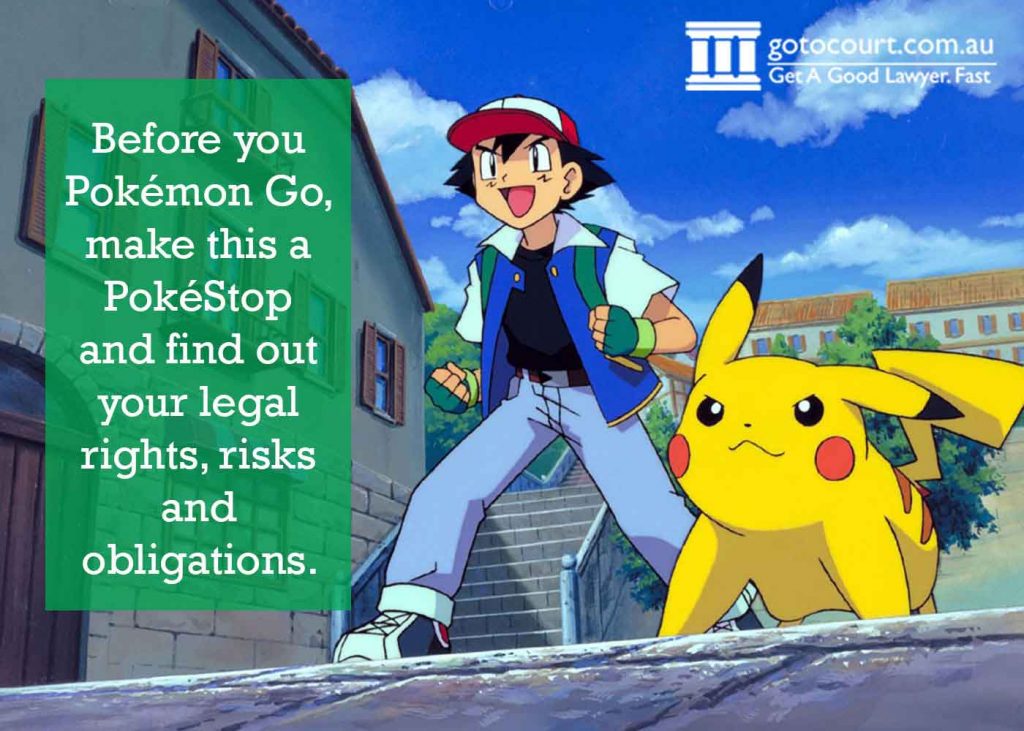 [/vc_column_text][/vc_column][/vc_row][vc_row][vc_column][vc_accordion active_tab=”false” collapsible=”yes”][vc_accordion_tab title=”Personal safety”][vc_column_text]
[/vc_column_text][/vc_column][/vc_row][vc_row][vc_column][vc_accordion active_tab=”false” collapsible=”yes”][vc_accordion_tab title=”Personal safety”][vc_column_text]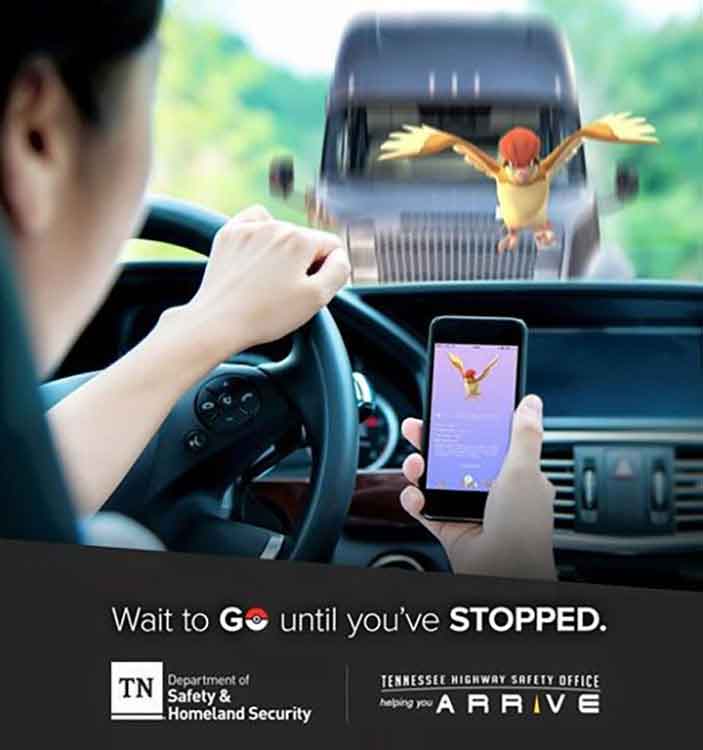 Perhaps the biggest problem already apparent is the risk the game poses to the safety of players. This risk takes a number of forms.
Perhaps the biggest problem already apparent is the risk the game poses to the safety of players. This risk takes a number of forms.
First, it presents a risk if you are walking around (or cycling, skateboarding, or otherwise travelling) with your eyes glued to the screen instead of watching where you are going. A number of people have reported injuries ranging from broken bones to bad bruises as a result of falling in holes in the ground, or tripping over something in their path. It is only a matter of time before someone steps out into traffic without thinking.
Second, a number of enterprising criminals have used the game to lure participants to isolated locations where they are held at gun or knife-point and robbed. Clearly, this is bad enough if you are an adult but could be catastrophic for a child. Of perhaps even more concern, the same tactics could be employed by predatory types, making sex offences and kidnapping a real risk.
Third, some of the locations the game selects as being ‘of note’ in a particular area are a little dubious. It reportedly made one collection place the back door to a methadone clinic in Kings Cross in Sydney; another landed you at a Hell’s Angels bikie club in Whanganui in New Zealand.
Fourth, if you are playing Pokémon Go while driving, you are quite likely breaking the law in all States and Territories in Australia. You are not allowed to touch your mobile at all unless you are parked in a designated parking area, and can face some significant penalties – not to mention a traffic accident – if you do not comply.
The flip-side of is the personal safety of non-participants. Home and business owners are being inundated by players who are competing for the characters and battling leaders. A man in Massachusetts in the US whose home is a renovated church reports that his property has been labelled a place of interest on the game, despite not having been a church for over 40 years. While he has taken the influx of participants well, others may not feel so comfortable about hordes of strangers lurking around their homes, particularly after dark.[/vc_column_text][/vc_accordion_tab][vc_accordion_tab title=”Trespass”][vc_column_text]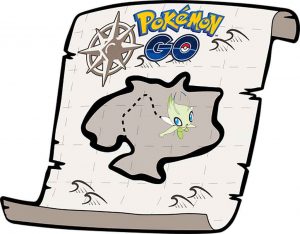 Because the game allows people to drop items at various locations, and because it has itself identified some private properties as places of note, players of the game who enter onto private property seeking out the creatures could potentially find themselves in trouble for trespassing.
Because the game allows people to drop items at various locations, and because it has itself identified some private properties as places of note, players of the game who enter onto private property seeking out the creatures could potentially find themselves in trouble for trespassing.
In Australia, you commit the offence of trespass if you directly and intentionally ‘interfere’ with someone else’s property without the owner’s consent. You don’t need to have caused any harm or loss to the owner or anyone else to be liable. You can, though, take photographs of private property unless you are actually ‘peeping’ at or stalking someone.
The risk of trespass has been managed to an extent by allowing participants to catch the Pokémon from a distance, but participants should be aware of the risk if they get a little too close.[/vc_column_text][/vc_accordion_tab][vc_accordion_tab title=”Nuisance”][vc_column_text]Nuisance in Australia is of two types: public and private. Both types involve some sort of infringement on the rights of a person to use and enjoy particular land. Private nuisance is a dispute between two persons and is only ever a civil matter (tort). It involves some kind of annoyance caused by one person that interferes with the rights of the other. It might involve, for example, noise from animals, tree roots growing into your land and interfering with drains, or aerial crop dusting. You have to prove that your complaint is not unreasonable or trivial.
Public nuisance can be both a tort and a crime which may attract a fine or term of imprisonment. It might involve, for example, a person blocking a public road, negatively affecting a wide range of people to varying degrees. You have to be able to show that it caused you special damage if you want to claim compensation; that is, your damage or injury must have been significantly worse than that caused to the general public. So, in the above example, blocking the road would have had to have been you would have to show that the road was your only means of getting to work or something similar.
The law relating to nuisance becomes relevant to Pokémon Go in a number of ways.
First, the question arises as to whether it could be argued that Niantic and Nintendo (and associated entities) have created nuisances on land that is not their own. Could they be held liable for attracting countless people to another person’s property? Arguably, it could amount to private nuisance as between the company and the landholder. Unless some kind of damage is caused, it will not amount to public nuisance.
Second, a problem for the US is that liability for nuisance can attach to a landowner for creating a hazard that might be attractive to others. For example, if a landowner creates a backyard playground that is foreseeably dangerous for, but attractive to, children, and a child enters onto the land without the owner’s permission, the landowner may well be responsible for any harm that comes to the child. The law is known as ‘attractive nuisance’. In terms of Pokémon Go, if the landowner were to drop an item on their land such that collecting the item involves something that is foreseeably dangerous, they may well be responsible for any injuries or fatalities that arise.
By contrast, in Australia, while attractive nuisance isn’t recognised as a cause of action, creating an attraction has been held to be relevant to the question of foreseeability of risk in relation to civil liability negligence claims (see eg Doubleday v Kelly [2005] NSWCA 151). It is conceivable, then, that a negligence action could arise as a result of enticing participants in Pokémon Go to a hazardous area, as long as a duty of care can be established.[/vc_column_text][/vc_accordion_tab][vc_accordion_tab title=”Negligence”][vc_column_text] Negligence also poses an interesting question for the law for non-participants. For example, could Niantic and its associates become liable in negligence for the reckless or dangerous placement of gyms or items? Do they owe a duty of care to the participants? Perhaps more worrying is the question of liability for a landholder who has not voluntarily engaged in the game, but on whose land a player suffers injury or death while trespassing in order to catch a Pokémon creature. Would the land owner be indemnified because they were not actually involved in the game, even if there was a hazard on their land? Can a duty of care be established here? If they are indemnified, who would do the indemnifying? Would it mean that Niantic would become liable? Or Nintendo? Google? Whose responsibility does it become? Or is it bad luck for the injured person?
Negligence also poses an interesting question for the law for non-participants. For example, could Niantic and its associates become liable in negligence for the reckless or dangerous placement of gyms or items? Do they owe a duty of care to the participants? Perhaps more worrying is the question of liability for a landholder who has not voluntarily engaged in the game, but on whose land a player suffers injury or death while trespassing in order to catch a Pokémon creature. Would the land owner be indemnified because they were not actually involved in the game, even if there was a hazard on their land? Can a duty of care be established here? If they are indemnified, who would do the indemnifying? Would it mean that Niantic would become liable? Or Nintendo? Google? Whose responsibility does it become? Or is it bad luck for the injured person?
This is, in part, answered by the Pokémon Go terms of service. These terms contain a specific clause saying that ‘The Pokémon Company’ is not responsible for any injury or fatality, or any kind of property damage, as a result of playing the game, or for any legal action that might be taken against a player. In addition, the terms specifically state that, in the event of any legal issue, you will have to engage in arbitration to sort the matter out, except in certain (and very few) situations. You can choose not to accept the arbitration clause but you have to provide written notice to Niantic within 30 days of accepting the terms. Though a liability clause does not always preclude legal action, it does make your case a whole lot more difficult.[/vc_column_text][/vc_accordion_tab][vc_accordion_tab title=”Ownership rights”][vc_column_text]A lawyer in the US has also wondered in a blog whether placing an augmented reality object on private property without the owner’s permission affects the owner’s interest in exclusive possession of the property. Aside from the issue of physical trespass by participants, he asks whether it is trespass – ‘intangible trespass’ – to place augmented reality figures on the land. Alternatively, does the property owner also become the owner of any ‘geo-locative intellectual property elements’ placed on their land – that is, can the owner make a ‘real world’ property claim over something that arises through cyberspace?
It is noted that by accepting the terms of service, you agree that virtual money and virtual goods are not worth anything to you in the real world, but if you are not a participant and have not accepted these terms, can the same rules apply?
Though these questions are open to challenge, it seems unlikely that any court would take the claim seriously.
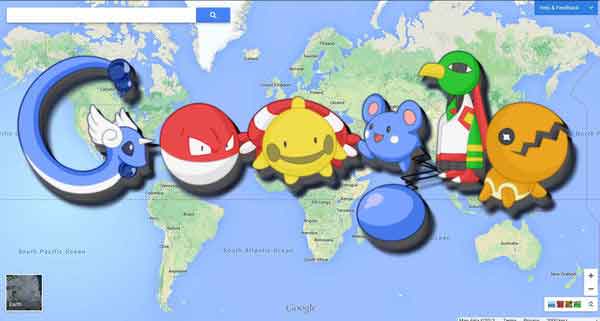 [/vc_column_text][/vc_accordion_tab][vc_accordion_tab title=”Privacy”][vc_column_text]
[/vc_column_text][/vc_accordion_tab][vc_accordion_tab title=”Privacy”][vc_column_text] Almost any game or app these days requires you to agree to the terms of service, including the privacy policy, before you are allowed to play. But how often have you actually read what you are signing up to?
Almost any game or app these days requires you to agree to the terms of service, including the privacy policy, before you are allowed to play. But how often have you actually read what you are signing up to?
For Pokémon Go, the terms and privacy policy attached are a little concerning from a privacy perspective. The privacy policy clearly states that Niantic and its associates will collect personal identification information including your Google email address or the email address you have registered on Facebook or the Pokémon Trainer Club. They also collect information about the web page you visited prior to logging in to the game. They track where you go and at what time, how you got to that place, the period of time you were there, and who else was around you at the time. In addition, if you sign in with your Google account (the only option for Australian users) on an iOS device, unless you make a point of going in and changing the settings, Niantic can access your entire account, giving them, for example, read and write access to your email and Google drive documents.
While the owning entities recently made a statement claiming that they don’t really look at much of the information they collect and are working on a ‘fix’ to prevent the iOS issue so that only your basic profile information data that the game ‘needs’ will be accessed, their terms still indicate otherwise. In fact, it states that they retain this information, and can share it with third parties including law enforcement. Some users have suggested a way around the issue is to create a second Google account which is used only for Pokémon Go. However, while this prevents access to your usual email and documents, it will still allow Niantic to collect and use your personal information and a limited web history.
You should also note that, if you download the app from the Apple Store, you have also agreed to use the app only with an Apple-branded product and in accordance with their terms of service. You should read their terms and their privacy policy, too, and make sure you understand what they mean for you.
(It is tempting to say here that the privacy policy allows Niantic to Pikachu – peek-at-you – and your information but probably best not to.)[/vc_column_text][/vc_accordion_tab][vc_accordion_tab title=”Other legal issues”][vc_column_text]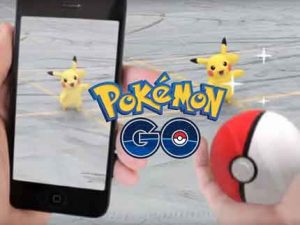 You might want to think twice about collecting your Pokémon in a courthouse. The New South Wales Justice Department has reminded participants in Pokémon Go that section 9 of the Court Security Act 2005 (NSW) makes it an offence to use your mobile device in court. The penalty could be as much as a $22,000 fine (200 penalty units) or 12 months in prison. Similar offences exist in other Australian States and Territories.
You might want to think twice about collecting your Pokémon in a courthouse. The New South Wales Justice Department has reminded participants in Pokémon Go that section 9 of the Court Security Act 2005 (NSW) makes it an offence to use your mobile device in court. The penalty could be as much as a $22,000 fine (200 penalty units) or 12 months in prison. Similar offences exist in other Australian States and Territories.
You might also want to think again about collecting Pokémon in playgrounds or around schools, especially when children are about. While you are not technically committing an offence (unless you are also taking photos for, for example, indecent purposes), it is not a good look for grown adults to be using a mobile device in these situations and you may find yourself being asked some fairly uncomfortable questions by police.
You are responsible for your account, even if someone else is using it. If they commit an offence in the course of playing while logged into your account, you could find yourself in hot water. In addition, if you are thinking of hiring someone to hunt down Pokémon creatures for you, you should note that it is considered a breach in the terms of service and Niantic can close your account. In the US, it may even amount to an offence if you share your log-in details with someone else.
There is always a risk that, where a number of highly competitive people playing the same game congregate in the one place, things could become aggressive. Threatening or violent behaviour is an offence in all States and Territories – even if a result of a game – and could result in criminal charges.[/vc_column_text][/vc_accordion_tab][vc_accordion_tab title=”Other things you need to know”][vc_column_text] As with any app, you should be aware of the cost of in-app purchases. Keep track of what you are spending and make sure you stay within your budget.
As with any app, you should be aware of the cost of in-app purchases. Keep track of what you are spending and make sure you stay within your budget.
If you are serious about your Pokémon Go, you will need to pack a battery charger and you may need to upgrade your data plan as it chews through both very quickly.
The company can cancel your access at any time and without notice.
If you are going to play the game, you should be respectful to the places you visit. The game has declared all sorts of places to be ‘gyms’, including police stations, hospitals, cemeteries and even the White House. Make sure you behave appropriately wherever you are. Unfortunately, the Holocaust Museum in Washington DC in the US has also been flagged, and – and in very poor taste – it has been reported that someone posted a photo of a Pokémon called ‘Koffing’, which emits a poisonous gas, beside a sign for the auditorium displaying the testimonials of Jewish people who survived the Nazi gas chambers. Hopefully, the report is, as has been since suggested, just a hoax.[/vc_column_text][/vc_accordion_tab][vc_accordion_tab title=”Last words”][vc_column_text]Please watch where you are going. As a pedestrian, keep an eye on traffic and the path ahead of you.
Be aware of what and who is around you – think about your personal safety. Don’t go to isolated areas alone.
Don’t drive while using your mobile phone.
Think about land and business owners and try not to be a nuisance to them.
Be respectful of the places you visit.
Read the privacy policy and terms of service to make sure you are okay with what you are signing up to.
Last of all, make sure you catch all of them![/vc_column_text][/vc_accordion_tab][/vc_accordion][/vc_column][/vc_row][vc_row][vc_column][vc_column_text]This article reflects the state of the law as at 14 July 2016. It is intended to be of a general nature only and does not constitute legal advice. If you require legal assistance, please telephone 1300 636 846 or request a consultation at www.www.gotocourt.com.au.[/vc_column_text][/vc_column][/vc_row]

Affordable Lawyers
Our Go To Court Lawyers will assist you in all areas of law. We specialise in providing legal advice urgently – at the time when you need it most. If you need a lawyer right now, today, we can help you – no matter where you are in Australia.How It Works






1. You speak directly to a lawyer
When you call the Go To Court Legal Hotline, you will be connected directly to a lawyer, every time.

2. Get your legal situation assessed
We determine the best way forward in your legal matter, free of charge. If you want to go ahead and book a face-to-face appointment, we will connect you with a specialist in your local area.

3. We arrange everything as needed
If you want to go ahead and book a fact-to-face appointment, we will connect you with a specialist in your local area no matter where you are and even at very short notice.



